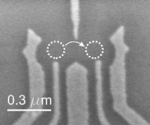 All that stands between today’s “strong” encryption and a total breakdown of security on the internet is the fact that brute force methods for cracking keys simply take too long. But quantum computers don’t process problems serially – they “sift” to find immediate solutions to mathematically hard problems. Therefore, the existence of a practical quantum computer could have huge ramifications for virtually all systems that rely on hard encryption for security (your online banking system, for example). Though still largely theoretical, the day of reckoning for traditional encryption is starting to look a little closer.
All that stands between today’s “strong” encryption and a total breakdown of security on the internet is the fact that brute force methods for cracking keys simply take too long. But quantum computers don’t process problems serially – they “sift” to find immediate solutions to mathematically hard problems. Therefore, the existence of a practical quantum computer could have huge ramifications for virtually all systems that rely on hard encryption for security (your online banking system, for example). Though still largely theoretical, the day of reckoning for traditional encryption is starting to look a little closer.
New Scientist: A new silicon chip capable of manipulating the spin of a single electron could ultimately allow futuristic quantum computers to be built using conventional electronic technology, researchers say. A quantum bit, or “qubit”, is analogous to the bits used in conventional computers. But, instead of simply switching between two states, representing “0” and “1”, quantum physics permits a qubit to exist in more than one state simultaneously, until its state is measured.
As it stands, human brains are slow, but compute in a massively parallel fasion. Computers are very fast, but pretty much attack problems serially (have to process one instruction at a time). Combine a computer’s inherent speed with publicly-available massively parallel computing (still theoretical, but on the horizon), factor in the infallibility of computer memory compared to human memory, and the world changes in ways we can’t begin to imagine. (cf: Kurzweil’s The Age of Spiritual Machines).
via Paul Conant

I’m — agog. This makes me want to go dig up some dirt in the garden. While solving the puzzle is stimulating, it feels like the effect on life is far too complicating.
One step closer to the Singularity ;)